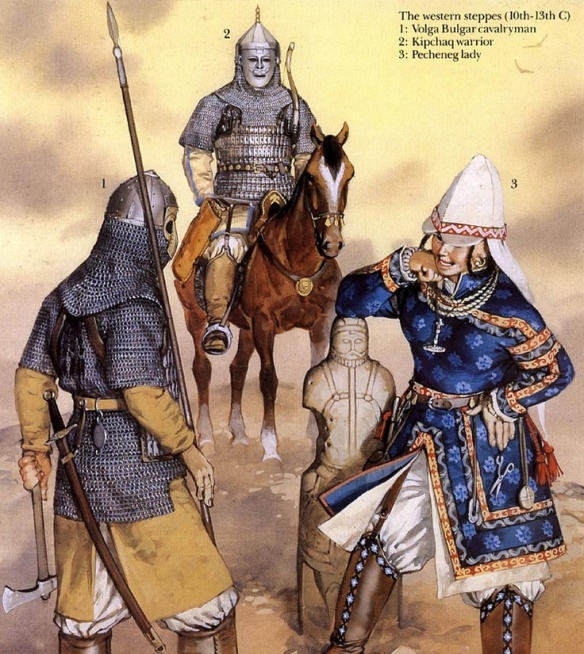
Qipchaq cavalry and infantry
A sprawling, disunited tribal confederacy, the Qipchaqs formed the base population of the Mongol GOLDEN HORDE.
The Qipchaqs first appeared around 750 as a Turkic tribe occupying the ALTAI RANGE. Later they moved west and joined the Kimek confederacy in western Siberia. Beginning around 1017 tribes fleeing the growing Kitan Empire in Mongolia pushed the Qipchaqs south and east. From 1070 until the rise of the Mongols, the Qipchaqs dominated the vast steppe from central Kazakhstan to the Danube River. The Qipchaqs had no unified state and never attempted to conquer their settled neighbors. Instead, clans, each under its own chief, either raided their neighbors or served them as mercenaries. Qipchaq warriors buttressed rulers in Bulgaria, Hungary, and GEORGIA, as did the Qangli (eastern Qipchaqs) in KHORAZM. Russia and CRIMEA, being less unified, suffered more from Qipchaq raids, although interethnic marriage among the chiefly families occurred there, too. Christian influence on the western Qipchaqs was significant, but most adhered to their native religion.
The first Mongol contact with the Qipchaqs came after 1216, when Qodu, a defeated chieftain of the Mongol MERKID tribe, took refuge among the Ölberi chiefs by the Ural Mountains. The Ölberi rejected CHINGGIS KHAN’s (Genghis, 1206–27) demand to surrender the fugitive, and the khan dispatched SÜBE’ETEI BA’ATUR, who raided the Qipchaqs and killed Qodu before returning. After the Mongols’ great campaign against Khorazm, Sübe’etei and JEBE again swung north through Derbent to reconnoiter the territory. After they defeated the Qipchaqs of the Kuban steppe, the western Qipchaq leader Köten (Kotian, Kötöny) received aid from his Russian son-in-law Msitslav of Halych, but Jebe and Sübe’etei crushed the combined Russian-Qipchaq army at Kalka River (May 31, 1223) before turning east. Meanwhile, Chinggis Khan had assigned to JOCHI, his eldest son, the conquest of the Qipchaqs. Jochi (d. 1225?) subdued the Qangli by 1224 but refused to move west, angering his father.
In 1229 Chinggis’s son ÖGEDEI KHAN (1229–41) sent Kökedei and Sönidei to conquer the Qipchaqs and other people along the Volga River and in the Ural Mountains, such as the BULGHARS, Saqsin, and Bashkir (Bashkort). The Mongol force proved too small for the fierce resistance of the Qipchaq chief Bachman, and in 1235 Ögedei mobilized a much larger expedition headed by his nephews BATU (son of Jochi) and Möngke and his son Güyüg together with Sübe’etei. Some Ölberi Qipchaq chiefs surrendered and joined the Mongol army, but most fled the area; some joined Bachman’s guerrilla resistance. Möngke finally captured Bachman’s island base in the Volga delta in winter 1236–37. By autumn 1238 other princes had conquered the Qipchaqs of Crimea and the Ukrainian steppe. Köten led a large number of Qipchaqs in flight to Hungary, which the Mongols invaded next. Qipchaq chiefs in the Caucasus resisted until 1242.
Batu and the sons of Jochi divided up the entire Qipchaq steppe among them. Batu on the Volga headed the “Princes of the Right Hand,” west of the Ural River, while his elder brother Hordu headed the “Princes of the Left Hand,” in the old Qangli territory. Together they formed what Russian historians termed the GOLDEN HORDE but which Islamic sources always call the Qipchaq ulus (realm). Under ÖZBEG KHAN (1313–41) the Jochids became Muslim, yet as late as 1330 MUHAMMAD ABU- ‘ABDULLAH IBN BATTUTA considered the Qipchaqs primarily Christian. The merging of the Muslim Mongols and the Turkic Qipchaqs eventually produced a new Turkic-speaking, Islamic, nomadic people, commonly called the TATARS. Their modern descendants include the Crimean, Astrakhan, and Siberian Tatars, the Kazakhs, the Nogays, and the Karakalpaks.
After Jebe’s and Sübe’etei’s campaigns Qipchaq prisoners served the Mongols in North China as warriors and as horse herders for the khans, known also as Qarachi from their task of making clarified fermented mare’s milk (Turkish, qara-qumiz). Under QUBILAI KHAN (1260–94) TUTUGH (1237–97), an Ölberi Qipchaq, won distinction in battles against QAIDU KHAN, and the Qipchaqs were gathered under his command as a special guards corps. Qangli guards were also formed in 1308–09. The Qipchaq guards achieved great political power, and Tutugh’s grandson EL-TEMÜR led the 1328 coup d’état that put Tuq-Temür (titled Wenzong or Wentsung, 1328–32) on the throne. These Qipchaq guards retreated to Mongolia with the Yuan emperors in 1368, and under the name KHARACHIN (the modern plural of Qarachi) they nomadized in central Inner Mongolia.
Further reading: Th. T. Allsen, “Prelude to the Western Campaigns: Mongol Military Operations in the Volga- Ural Region, 1217–1237,” Archivum Eurasiae Medii Aevi 3 (1983): 5–24; Peter B. Golden, “Nomads in the Sedentary World: The Case of Pre-Chinggisid Rus’ and Georgia,” in Nomads in the Sedentary World, ed. Anatoly M. Khazanov and André Wink (Richmond, Surrey: Curzon Press, 2001), 24–75.